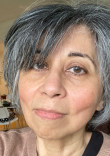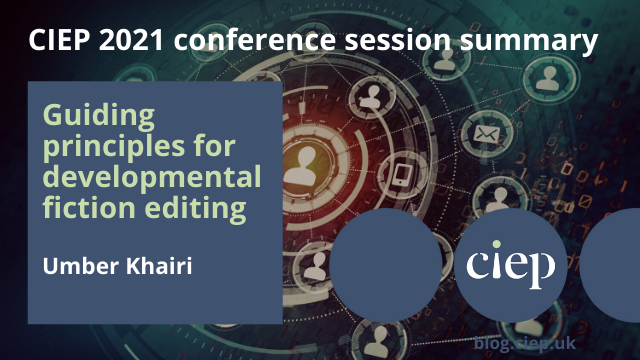This year’s CIEP conference was held online, from 12 to 14 September. Attendees from all over the world logged on to learn and socialise with their fellow editors and proofreaders, and a number of delegates kindly volunteered to write up the sessions for us. Umber Khairi reviewed Guiding principles for developmental fiction editing, presented by Sophie Playle.
‘Remember, it’s not your book!’
That was one of the important principles of developmental editing that Sophie Playle reminded us of repeatedly throughout her well-attended session at the 2021 conference.
Her presentation was useful for both experienced editors and relative newbies to fiction editing because it revisited what exactly developmental editing consists of. Sophie emphasised the need to formulate a framework of guiding principles to steer your work as a developmental editor
Before understanding what developmental editing is, one needs to understand what it is not. Sophie made this clear, reminding us that as a developmental editor you are not acting as a beta reader – a reader whose response is essentially subjective and reactive. Neither are you acting as a copyeditor; your role as a developmental editor is to help the author get the foundation and structure of the book right, rather than polishing it and adding finishing touches. Here, she used the analogy of acting as an architect or engineer rather than as a professional involved in the decorating and finishing work on a building.
Sophie shared the four guiding principles she uses as a developmental editor. She said these help to keep you focused on the nature of your role. Her four principles are:
- It’s not your book
- Define your service
- Be objective
- Understand the ‘rules’.
As she elaborated on these four points, Sophie pointed out that having clear principles in place can ‘keep things consistent and give you a clear sense of direction’…
Sophie emphasised the importance of remembering ‘It’s not your book’; it’s not the developmental editor’s job to rewrite the book. Instead, you should aim to understand the author’s goal and simply help them to make it the best book they can. This is where communication with the client is key. Sophie pointed out that it is fundamental to understand the author’s objectives – what they are trying to achieve with their book and their publishing goals (eg mainstream commercial or a family history project). Once you have understood their intent, you should make sure you are empathetic to the author’s vision; also, when you give feedback, do not be didactic or overbearing, rather ‘frame your feedback as suggestions’.
In terms of the second point – that you need to define your service – this is obviously key in any job that we, as editing professionals, take up but it is especially crucial in developmental fiction editing. Authors may be confused as to what exactly this involves and some may be under the impression that the developmental editor will magically transform the book, rather than help the author to work on pulling it all together. Sophie mentioned that you can choose how to name and define the service you are providing and what exactly it will entail. She added that the author must be made aware that you won’t be copyediting their work – the only line edits a developmental editor will make relate to the ‘bigger picture’ in terms of the book.
Her third guiding principle related to the question of objectivity and here Sophie emphasised that in developmental editing work, ‘analysis is key … tastes will vary but analysis is not opinion’. She mentioned that analysis should be rooted in theory so a developmental editor should have some knowledge of this as well.
The last principle was that a developmental fiction editor should understand the ‘rules’, that’s to say the conventions and expectations of different genres (romance fiction will have different expectations and ‘rules’ from a crime thriller, for example). She said it is true that convention can be flexible but that it is rare that authors can successfully subvert genre conventions – some do experiment but very few succeed.
There was a lively and useful Q&A session following Sophie’s presentation and quite a few participants seemed interested in the courses on developmental editing that she offers through her business, Liminal Pages with several people asking if these could count towards CIEP points for upgrading.
All in all, this was an extremely interesting and engaging session and one which provided clear and constructive guidance.
 Umber Khairi is a new CIEP member and has a background in journalism (print, then news websites, then radio). She took early retirement from the BBC in 2018 and she is co-founder of the independent, journalist-owned magazine, Newsline, in Pakistan. She is a compulsive proofreader. Areas of interest include South Asia, Islamic culture, the news media, current affairs, new fiction and health and nutrition.
Umber Khairi is a new CIEP member and has a background in journalism (print, then news websites, then radio). She took early retirement from the BBC in 2018 and she is co-founder of the independent, journalist-owned magazine, Newsline, in Pakistan. She is a compulsive proofreader. Areas of interest include South Asia, Islamic culture, the news media, current affairs, new fiction and health and nutrition.
 About the CIEP
About the CIEP
The Chartered Institute of Editing and Proofreading (CIEP) is a non-profit body promoting excellence in English language editing. We set and demonstrate editorial standards, and we are a community, training hub and support network for editorial professionals – the people who work to make text accurate, clear and fit for purpose.
Find out more about:
Posted by Abi Saffrey, CIEP blog coordinator.
The views expressed here do not necessarily reflect those of the CIEP.

